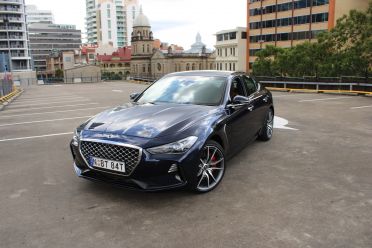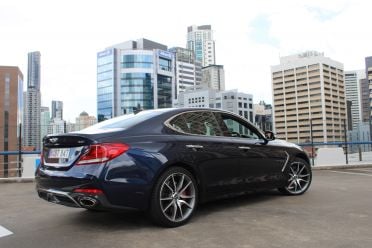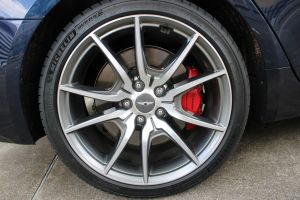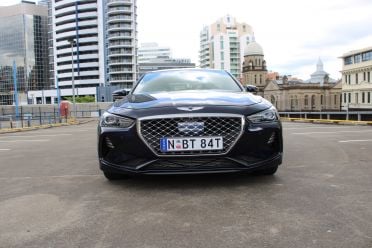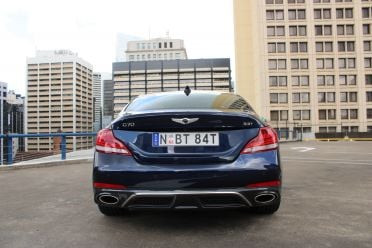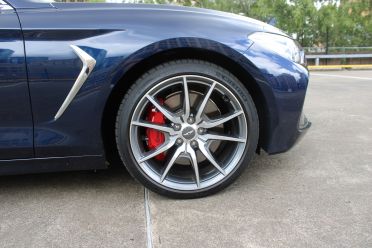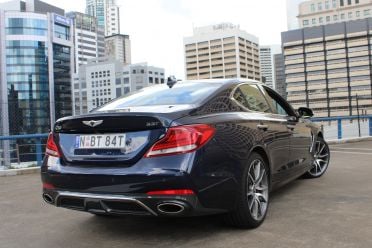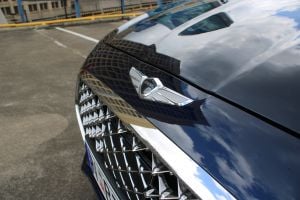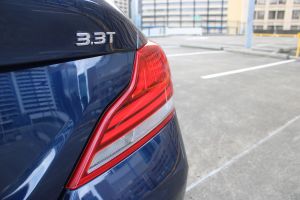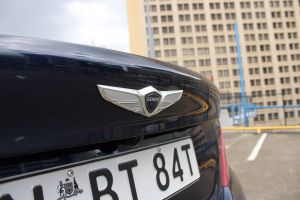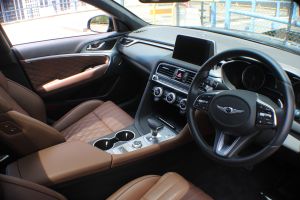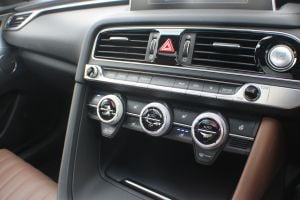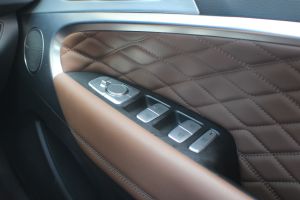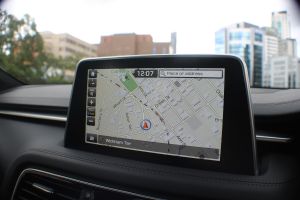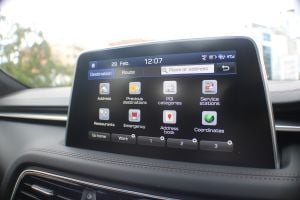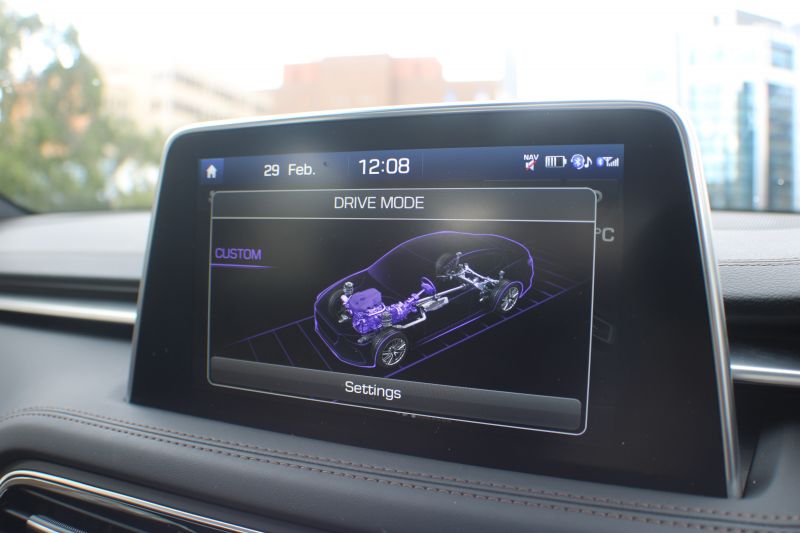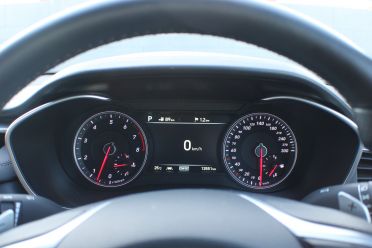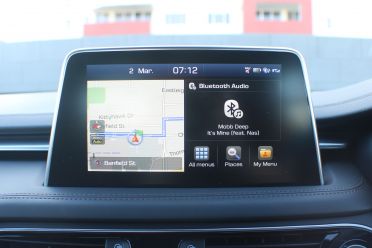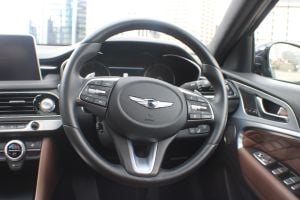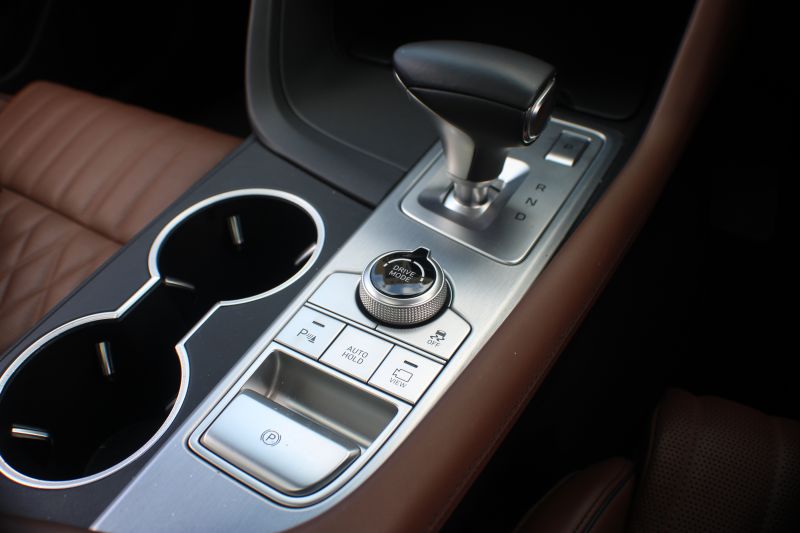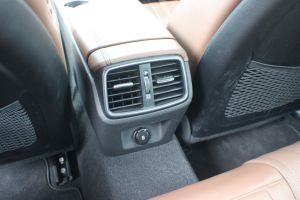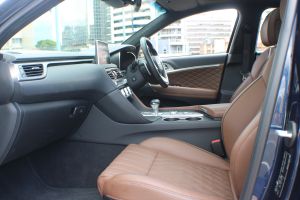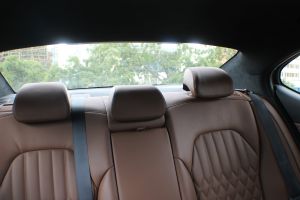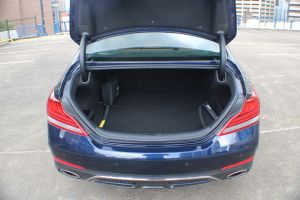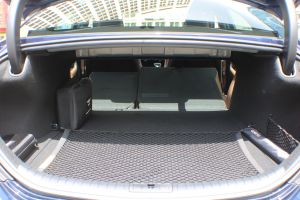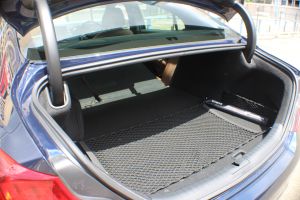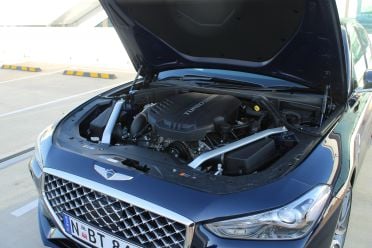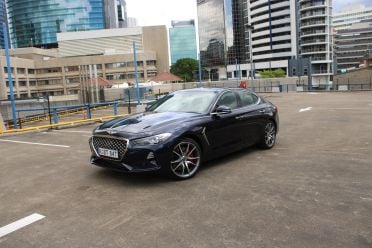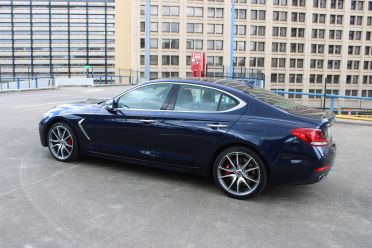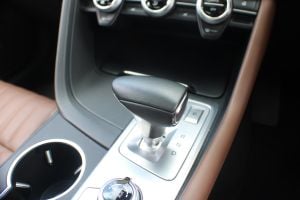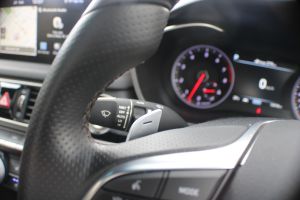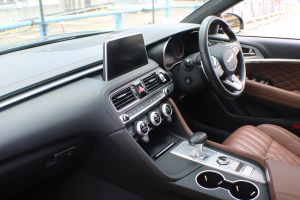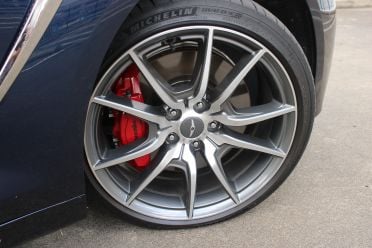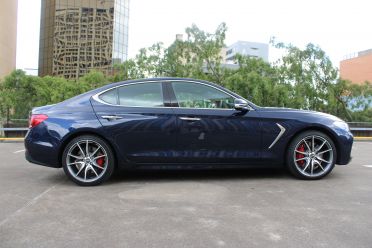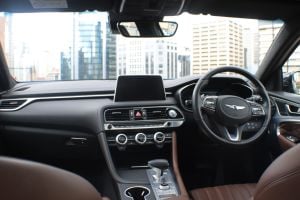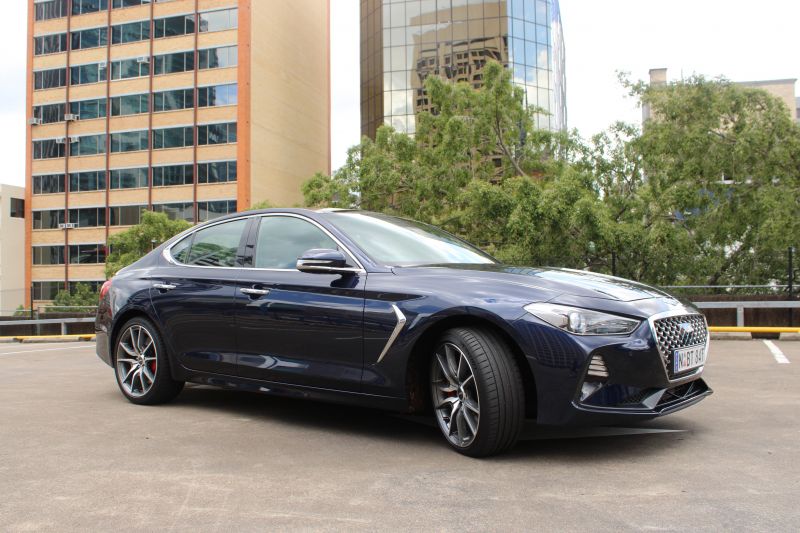We’ve seen it before.
An upstart challenger enters the mid-sized premium executive sedan segment, gunning for the Germans.
Lexus has been at it the longest with its IS but, since its launch in 1999, insurgents have come from Alfa Romeo, Infiniti, Jaguar, and Volvo.
None of them have been able to knock BMW and Mercedes-Benz off the top two spots of the podium in terms of sales, while Audi has continued to ascend.
With just one dealer nationwide at the moment, Genesis can’t even begin to imagine taking those stalwarts down a peg.
Hyundai’s luxury brand can, however, hope to appeal to buyers tired of seeing a C-Class and 3 Series in every office car park.
The Genesis G70 certainly got the attention of almost every male passer-by, generating lots of interest and earning itself plenty of compliments.
It has the balanced, rear-wheel drive proportions of an Alfa Romeo Giulia and a bold grille almost as large as that of a Lexus IS – but decidedly more elegant.
The roofline curves gracefully down towards the squat rear, while the 19-inch alloy wheels and red Brembo brake callipers look like they mean business.
The G70 also attracts attention because there are still so few on the roads, with Genesis only having one dealership. Two more are expected to open this year, unless COVID-19 derails those plans.
Last year, Genesis sold only 63. Let’s see how much that improves in the Genesis G70’s first full year on the market.
How much is it?
The G70 range opens at $59,300 before on-road costs with the base 2.0T.
The cheapest twin-turbo V6 model is the 3.3T Sport at $71,313 before on-road costs, with the featured 3.3T Ultimate and its sportier-looking 3.3T Ultimate Sport companion both priced at $77,082 before on-road costs.
Genesis touts its no-haggle approach to sales, which means the G70 has fixed pricing. Nevertheless, it’s still terrific value.
At this price point, you’re looking at mid-range Germans with turbocharged 2.0-litre four-cylinder engines, such as the Mercedes-Benz C300 and BMW 330i.
To get this kind of performance from a German rival, you’d be looking at spending close to (or over) $100,000 for an Audi S4, BMW M340i, or Mercedes-AMG C43.
What do you get?
All 2020 G70 models come standard with adaptive cruise control, dual-zone climate control, proximity entry with push-button start, Qi wireless phone charging, power boot lid and 12-way power front seats.
An 8.0-inch touchscreen infotainment system with Android Auto, Apple CarPlay, satellite navigation and DAB+ digital radio is also standard across the range.
All four- and six-cylinder G70 models bar the base 2.0T have 19-inch alloy wheels with Michelin Pilot Sport 4 tyres, Brembo brakes, and a limited-slip differential, though adaptive suspension is exclusive to six-cylinder models.
All six-cylinder Genesis models also use four-piston front Brembos and two-piston rear ones, while 2.0T and 2.0T Ultimate models make do with single-piston Brembos front and rear.
Six-cylinder models also pick up dynamic torque-vectoring and a variable gear ratio steering rack.
Ultimate models upgrade the standard nine-speaker sound system to a 15-speaker Lexicon by Harman premium system.
The quilted leather trim is also replaced with supple Nappa leather, the front seats pick up ventilation, and there’s also a standard head-up display, 360-degree camera, 16-way power driver’s seat, a power tilt and telescoping and heated steering wheel, and heated rear seats.
Is the Genesis G70 safe?
When the Genesis G70 was tested by ANCAP in 2018, it received a five-star rating.
All 2020 Genesis G70 models come standard with autonomous emergency braking with forward-collision warning and pedestrian detection, as well as lane-keeping assist, lane-departure warning, blind-spot monitoring, and rear cross-traffic alert.
What’s the G70 like on the inside?
Sitting inside the G70, it’s clear BMW – not Mercedes-Benz – was the inspiration for Genesis.
That’s most evident in the design of the centre stack, angled as it is towards the driver.
The way it juts out makes everything easily accessible to the driver, though it has the unfortunate side-effect of intruding on the front passenger’s space.
Riding shotgun in the G70 does leave you feeling rather hemmed in. Toe room is lacking, too. Where Genesis differs from its German rivals is in its interface.
There’s no rotary controller to access functions like climate control and media. Instead, everything is done through the touchscreen or using the many (but not too many) tactile buttons and knobs.
Everything falls easily to hand and there’s a quality feel to all the switchgear, particularly the three metal-ringed knobs for the climate control.
A lottery winner upgrading from a Hyundai i30 Rio to a G70 will have no problem navigating the controls.
That’s both a good thing and a bad thing. While it’s unlikely someone will be moving from an i30 to a G70, should they do so, they’ll notice the G70 uses the same touchscreen interface.
While back in the days of Winamp we used to be able to download different “skins”, Genesis hasn’t seen fit to give the Hyundai interface a new appearance.
The gauge cluster, too, will be familiar to anybody who’s been in a Kia Stinger. Though the gauges are clear and legible, a car at this price point deserves a cluster more visually interesting.
There’s a larger touchscreen in the Hyundai-Kia-Genesis parts bin – the 10.25-inch unit in the new Kia Seltos – and hopefully that’ll arrive with the upcoming mid-cycle enhancement.
The new G80 and GV80 also appear to use a new infotainment system with a look distinctive to Genesis.
There’s nothing wrong with how any of the G70’s parts-bin items operate but it does leave the G70 feeling a little less special inside. That’s a shame, as the interior is otherwise a class act.
In terms of overall design and material quality, the G70 is on par with its rivals. The quilted Walnut Brown leather trim in the G70 Ultimate adds a welcome splash of colour to the interior.
There’s also leather trim on the centre console and doors, stitching details on the dashboard, and soft-touch plastics everywhere except the very bottom of the doors.
If you aren’t down with brown, the G70 can also be had with Vanilla Beige or Obsidian Black seating surfaces. There’s also an alluring Velvet Burgundy option that keeps the seats black but changes the colour of the dashboard to a rich red.
A set of alloy pedals would be nice, though they’re available in the G70 Sport and Ultimate Sport models.In those models, your only interior colour way is the very dark Sport Grey, lightened up with red stitching highlights.
Another detail that should ideally be standard in the Ultimate is a capless fuel filler – no dirty fuel cap should be dangling against this gorgeous Adriatic Blue paint.
The tester mystifyingly lacked Android Auto, though all 2020 models now have it.
There’s ambient lighting but it’s limited to the footwells, while the panoramic sunroof is rather deceptively named.
From outside, it looks as though it takes up a large portion of the roof, as on the bigger G80, but inside it’s scarcely bigger than some “regular” sunroofs.
Whenever any luxury brands enter this segment with a new model, it seems as though they’re using an E46 BMW 3 Series as a benchmark, even as the BMW has evolved to become larger and softer.
Like Alfa Romeo and Cadillac before it, Genesis has engineered a car with superb dynamics but a cozy cabin.
The G70 is noticeably tighter inside than the mechanically-related Kia Stinger due to a wheelbase that’s 70mm shorter.
Rear seat room, for example, is snug. The G70 has 884mm of rear leg room and 1387mm of rear shoulder room.
That’s less than some small sedans from mainstream brands, not helped by the rear-wheel drive G70’s sizable transmission tunnel.
There are three top-tether and two ISOFIX anchors for child seats.
The G70’s boot is disappointingly small. With just 330L, it has considerably less volume than the 3 Series (480L) and C-Class (435L), and it also has a high floor.
Fortunately, the rear seats split and fold 60:40, though the BMW again bests that with a 40:20:40 split-fold rear seat.
Nevertheless, if you’re looking for tremendous versatility and palatial accommodations, you’re probably not shopping for a sedan in this class.
What’s under the bonnet?
The rear-wheel drive G70 offers two different powertrains: a turbocharged 2.0-litre four-cylinder engine producing 179kW and 353Nm, and a twin-turbocharged 3.3-litre V6 engine producing 272kW and 510Nm.
Both are mated exclusively to an eight-speed automatic transmission.
In other markets, the G70 is also available with all-wheel-drive, a six-speed manual and a 2.2-litre turbo-diesel four-cylinder engine, though not all together.
What’s the G70 like to drive?
The larger Genesis G80 doesn’t immediately make clear its athletic bent, only revealing the breadth of its abilities when your drive becomes spirited.
Conversely, the G70 advertises itself as a sports sedan from the second you press the start button.
The ride is firm, the steering is precise with excellent weighting, and the car feels poised, though there’s sometimes a slight delay from a standing start in the G70’s default Comfort drive mode.
Nevertheless, the car feels ready to toss down a winding back road.
While in some cars Sport mode scarcely feel different, the G70’s personality amplifies the second you twist the knob. The side bolsters of the driver’s seat squeeze you in, the steering gains more weight, the adaptive dampers firm up and the shift pattern changes.
In this mode, the beast comes alive. You have to modulate your throttle application if you want to take off cleanly, all 272kW ready and raring to go.
The ride quality in Sport mode diminishes though it’s still far from uncomfortable. You do, however, get jostled somewhat by bumps and imperfections in the road. It feels right at home on a winding mountain road, with excellent grip from the Michelin Pilot Sport tyres.
The G70 keenly hugs the road in corners and there’s terrific balance to the chassis.
Shifts from the in-house eight-speed automatic transmission are quick. Behind the steering wheel you’ll also find tactile, attractive paddle shifters.
The only issue we experienced with our G70 was a shuddering coming from the brakes in more aggressive driving, though our tester had rather high mileage for a press car and had likely been driven hard and put away wet by numerous automotive journalists.
If your only experience with the G70’s 3.3-litre V6 is from a Kia Stinger, you’ll be pleased to learn the Genesis has been tuned to have much more of a snarl. This isn’t just a Stinger in a tux. It’s lighter on its feet, smaller overall, and more sonorous.
0-100km/h is dispatched in a fleet 4.7 seconds, over a second quicker than similarly-priced Germans.
The G70 is so impressive a backroad companion, it leaves you wondering what Genesis’ talented engineers could do with the likes of a BMW M3 rival.
Back in town and flicked back to Comfort mode, the G70’s ride is surprisingly firm. That’s likely due to the gorgeous 19-inch wheels.
It does leave the ride feeling slightly unsettled on poorly surfaced roads.
There are three other drive modes to choose from. Eco maximises efficiency, Custom allows you to tailor steering, suspension and throttle response, while Smart adapts to your driving style and alters settings accordingly.
In a mix of urban, highway, and breakneck mountain driving, the G70 averaged 13.6L/100km on the recommended 95RON premium unleaded fuel.
That’s a bit higher than Genesis’ combined fuel economy claim of 10.2L/100km, though a more sedate driving style might yield a closer result.
How much does the G70 cost to run?
Genesis offers complimentary scheduled servicing for the first five years or 50,000km, whichever comes first.
The company will also pick up and return your vehicle from servicing appointments and provide you with a courtesy vehicle to use until your G70 is ready.
These features are in addition to Genesis’s five-year, unlimited-kilometre warranty and five years of free 24/7 roadside assistance.
The after-sales package is impressive, especially considering BMW and Audi still currently offer three year warranty coverage. Mercedes-Benz has only just announced its move to a five-year warranty.
CarExpert’s take on the 2020 Genesis G70 3.3T Ultimate
The Jaguar X-Type and XE couldn’t topple the Germans in the sales race, nor could the Alfa Romeo Giulia. Even after over twenty years, the Lexus IS is consistently outsold by the BMW 3 Series, let alone the segment juggernaut that is the Mercedes-Benz C-Class.
The Genesis brand may be unfamiliar to many still but it’s following part of the same formula corporate parent Hyundai did over 30 years ago.
The G70, therefore, offers a lot of bang for your buck, with more features and more power than similarly-priced rivals from established brands.
Where Genesis differs from Hyundais of yore in strategy is by employing terrific dynamics and exceptional build quality to lure buyers from competitors.
It’ll take time for Genesis to earn the prestige of rival brands but it ought to earn your respect for the sheer breadth of its abilities.





